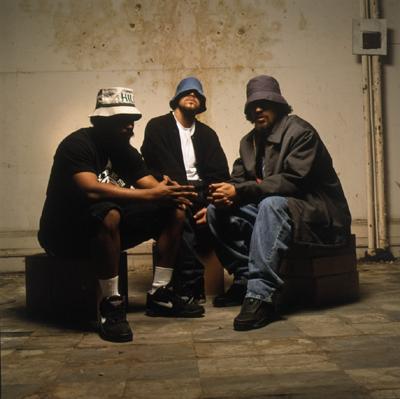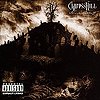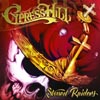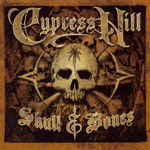
A FIRESIDE
CHAT WITH ERIC BOBO OF CYPRESS HILL
You
say joint and I think three things: Friday, Snoop Dog, and Cypress Hill.
Oddly, Cypress is about as OG as it gets when it comes to the chronic.
They've been rapping about it for years. At they're peak, B-Real was f-ing
Carmen Electra. Now JLo got nothing on Carmen, who even after Rodman is
still a piece of ass and B-Real was banging her before the he-she rebound
master. But times are a changing and so is Cypress. And Eric and I sat
down and talked about just that, change, unedited and in his own words.
FRED JUNG: Let's start from the beginning.
ERIC
BOBO: Well, I started playing because my father was a jazz musician. I
started playing from age five. Growing up, I was doing the Latin jazz
thing and going to college and then into the hip-hop, alternative world.
So it has been part of my live since I can remember.
FJ: Initially, you were listening to jazz?
ERIC
BOBO: Well, yeah. My background is Latin jazz. I started because my father
Willie Bobo influenced me and I started playing with him from the age
of five.
FJ: Your father is Willie Bobo, the timbalero?
ERIC
BOBO: Yeah, so that is where it all started from and I played with him
at jazz clubs and festivals and I took over his group when he passed away.
I was fifteen. I was in college and I majored jazz studies, did the big
band thing and jazz combo, all of that stuff and eventually stuck with
the hip-hop, alternative world, which I'd already been a fan of.
FJ: Why did you not take the more familiar road of jazz?
ERIC
BOBO: Well, because it didn't prove to be so easy at first. I think it
is very hard, especially for me, to just try to establish myself. It effected
his fans pretty hard and a lot of people were really skeptical if I was
as good as he was and there was a lot of doubt, so what I had to do was
I had to make a niche for myself and do that. My solo album, which I am
starting to work on, I go into the studio this month, is going to be Latin
jazz. I am returning to that. Like I said, I did a lot of the jazz festivals
and played with a lot of people during that time, but it was hard, especially
in LA because a lot of the jazz clubs were closing and there really wasn't
a jazz market as it was when I was young. There wasn't a viable atmosphere.
FJ: Your father passing away at such a crucial period in your life must
have been very difficult.
ERIC
BOBO: Yeah, yeah, it was. That was my mentor and losing him at that young
of an age and then having all of those questions like, "What do I
do here? What happens here?" And having no one to go to was pretty
difficult, but I knew that I had to keep on going for as long as I was
allowed to and so far it has been all right.
FJ: How did you meet the Cypress Hill gang?
ERIC
BOBO: Well, I had met Cypress when they had just done their first album
and their first album had been out for probably about a year. We got to
talking about me possibly jamming with them because I was doing the percussion
thing. They had never ventured into having a live percussion thing with
their outfit so it was a different thing for them. This was in '92. We
started out doing a couple of shows and it worked and I've been doing
it ever since.
FJ: Coming from a jazz background and jumping into the deep end of the
hip-hop community with Cypress Hill must have been the mother of all culture
shocks?
ERIC
BOBO: It is strange and at times overwhelming, at times, just to see how
people react to us. Here we are doing something that we love and we love
the admiration and everything. But to some of these kids, it is almost
like a fulfillment of a dream and it kind of overwhelms me in the way
that they have Cypress Hill tattoos and all of the records and posters.
It is great that we have been able to reach that many people worldwide
and continue to do that.
FJ: Cypress Hill pioneered blending the hip-hop elements with Latin flavor,
which has become in style of late.
ERIC
BOBO: Well, I think it is cool. It is coming like full circle. In the
beginnings of hip-hop, even though the groups that broke hip-hop open
were like Run-D.M.C. and Grandmaster Flash and they were predominantly
black groups, but Hispanics were there from the get go as well. A lot
of the breakdancers, a lot of the early guys were all Puerto Rican or
Dominican or of Latin decent. So in the midst of things, things have come
kind of full circle. Now with Cypress Hill and Big Pun, all these groups
that have helped to bring it now, even more into the forefront. It is
great because in the Latin countries, there is a lot of hip-hop out there
and they are really doing things. It is rewarding.
FJ: Your take on Ricky Martin.
ERIC
BOBO: He is doing his thing, but that is not real salsa. It is more of
a popish kind of thing. I commend him for helping to open up people's
ears to Latin music. I think that he was very important in doing that.
He is doing his thing. I don't hate what he is doing at all. I'm not a
Ricky Martin fan that I bump his CD and have his CD in my CD player, but
I commend him for what he is doing for Latin music and the people.
FJ: Cypress Hill's demise has been the headline for the past few years.
ERIC
BOBO: You know, Fred, it was disturbing at times because we as a group,
every group goes through its little trials and tribulations, but it is
one thing to be called out when you are not. Just to have to deal with
all the questions and the rumors and the people saying, "Well, it
this it? Is it over? You guys don't have it anymore. Cypress Hill is done."
All of this stuff, we had to go through and we really stuck to our guns.
We didn't believe that it was done. That was the most important thing.
We did not believe that it was over and we knew that we had more music.
The fact that Sen Dog wasn't in the group for a while, that all came full
circle as well. We are proving that we still have more music and we still
have more and more things to do. It is a really, really good album. It
is something we are all really proud of and the people are really being
receptive to it. It is kind of like, it came full circle, but man, Fred,
it really sucked for a while. You hate to be told that you can't do something
or you are not going to be able to do something when you know in your
heart that you can. With this album, we came up like underdogs. People
were going to say that they were over. They are done and on to the next.
That was not going to sit too well with us.
FJ: But the music going underground makes it real.
ERIC
BOBO: You know what, Fred, it is good. You get a chance to do it the way
that you first started. It was good. It was good to be refreshed like
that. When everything is given to you on a silver platter, it is very
easy to get used to that and get caught up in all of that. It was good
to know that we are still hungry enough so we can really work at it and
come up with something valid.
FJ: Let's touch on the new release, Skull & Bones, a departure from
the Cypress norm.
ERIC
BOBO: It was good. We all came fresh. We all came fresh. On Cypress IV,
we really didn't tour for that as much as we had for previous records.
We decided to take a summer off, a year off and really concentrate on
this record. I think we put a lot, a lot into this. I was going into the
studio everyday and it was a fun record to make.
FJ: The album is on two discs, one titled Skull and another, Bones.
ERIC
BOBO: We have alternative fans and we have hip-hop fans and just our new
heavier sound is something that we are just starting to get all together.
To put it all together, I don't know, but you have to get used to this
sound. I think. The hip-hop kids might go, "Oh, my God, what are
they doing?" We don't want to alienate our fans, but we don't want
to discourage them either. It is kind of like a select your moods kind
of thing. If you feel like hearing the traditional hip-hop, you can put
on the Skull disc. If you feel like getting a little bit more heavy, you
can put on the Bones disc. I think it is also a good introduction for
people to know that this is kind of our direction. Next time around, most
likely, it will all be together, but it was a good idea because it is
kind of a select your moods kind of thing.
FJ: Ease them into it.
ERIC
BOBO: Yeah. Rather than throwing it all out there and they are like, "What's
going on?" It was for the listeners because we did an albums worth
of the more heavier stuff, but you have to ease them into it.
FJ: You do two versions of "Superstar," a rock rendition and
a rap one, which one will you do live?
ERIC
BOBO: We usually do the rock version. We bust out the band and stuff like
that. We do it like that.
FJ: What is a Cuban necktie?
ERIC
BOBO: A Cuban necktie is actually a take off of a Columbian necktie. What
it is is for the gangster that did something bad in Columbia, they cut
a hole in their neck and take their tongue and put it in through their
neck like it is a necktie. So this is like a play off of that. It is a
cool title, but it is just a freestyle kind of stuff. The rhymes are not
anything like that, but it is a cool little title.
FJ: How do you occupy the down time?
ERIC
BOBO: Well, I like my sports. I like to play sports. I'm like a kid at
heart so I like playing video games. I like to get away a lot of times
and just do normal, everyday things.
FJ: What is your consol of choice?
ERIC
BOBO: Right now, it is Sega Dreamcast. I basically have that and Playstation.
I like to switch it up.
FJ: Cypress Hill has always been a strong proponent of the legalization
of marijuana, but the media has taken that very small facet and morphed
it to seem as if that is the central and only aspect of the band and its
members. Must get old.
ERIC
BOBO: Yeah.
FJ: It has really haunted you guys.
ERIC
BOBO: Yeah, and will always (laughing). Well, I think on the first couple
of records, Cypress was like one of the groups to outwardly say that this
is what we do. Not telling anyone else to do it, but saying that this
is what we do and being a bit more outspoken about it. The media thinks
that is all that important and a lot of times they play on it a little
too much. And the thing is, we are definitely a supporter of the cause,
especially decriminalization and definitely supporters of medical marijuana.
We don't feel that we have to talk about smoking in every song. It is
just what we do and if they want to get, go ahead. Now, it is not as important
to put it in the forefront of everything that we do. Fans of Cypress Hill
know what Cypress Hill stands for and what we're about. I think that the
media wants to run with this so much, but that only adds to the awareness.
They are in our part helping us do our jobs as far as getting the message
out there.
FJ: Having cleared that up, what is Cypress Hill about?
ERIC
BOBO: Hip-hop from the heart with real life scenarios. We are trendsetters,
not followers. We stand our ground. We support the causes that we believe
in and we don't compromise.
Fred Jung is the Editor-In-Chief and is it me or is Audition the most
frightening film ever? Comments? Email
Him



